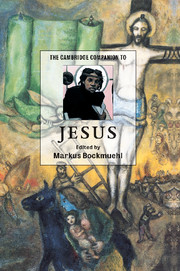Book contents
- Frontmatter
- Introduction
- Part I The Jesus of history
- Part II The History of Jesus
- 8 Sources and methods
- 9 Quests for the historical Jesus
- 10 The quest for the real Jesus
- 11 Many gospels, one Jesus?
- 12 The Christ of the Old and New Testaments
- 13 Jesus in Christian doctrine
- 14 A history of faith in Jesus
- 15 The global Jesus
- 16 Jerusalem after Jesus
- 17 The future of Jesus Christ
- Bibliography
- General Index
- Scripture Index
13 - Jesus in Christian doctrine
from Part II - The History of Jesus
Published online by Cambridge University Press: 28 May 2006
- Frontmatter
- Introduction
- Part I The Jesus of history
- Part II The History of Jesus
- 8 Sources and methods
- 9 Quests for the historical Jesus
- 10 The quest for the real Jesus
- 11 Many gospels, one Jesus?
- 12 The Christ of the Old and New Testaments
- 13 Jesus in Christian doctrine
- 14 A history of faith in Jesus
- 15 The global Jesus
- 16 Jerusalem after Jesus
- 17 The future of Jesus Christ
- Bibliography
- General Index
- Scripture Index
Summary
In AD 325 the Council of Nicaea affirmed the divinity of Jesus in the creed of Nicaea. This led to the emergence, over fifty years later, of the Nicene Creed, which defines the faith of the Christian church world-wide. At the heart of both stands the affirmation that Jesus Christ is 'God from God, light from light, true God from true God, begotten, not made, of one being [homoousios] with the Father, through whom all things were made . . .' The intention of both is clear. They wish to affirm with unambiguous clarity that Jesus is to be identified as God incarnate - God has not merely come in a human being but as human. What is less obvious is that the issue at stake here concerns the very possibility of Christian God-talk. Without this decisive affirmation, it is questionable not only whether the Christian church would have continued to exist, but whether its existence would have been warranted. The whole raison d'être of the church is the recognition that Jesus is not simply a good person, or an inspired prophet, or a person with spiritual insight but, rather, the very presence of God identifying with humanity and revealing himself to humanity in a reconciling act of pure and unanticipatable grace.
- Type
- Chapter
- Information
- The Cambridge Companion to Jesus , pp. 200 - 219Publisher: Cambridge University PressPrint publication year: 2001
- 2
- Cited by

